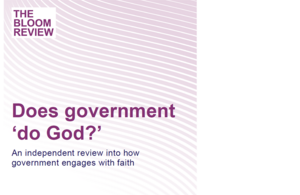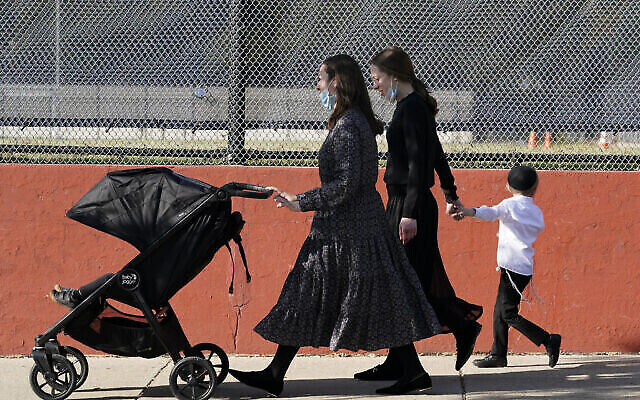Charedi ‘forced’ marriage misunderstood in government faith engagement report
More than 21,000 people responded to a landmark public consultation launched in 2019 by independent faith engagement advisor Colin Bloom.
A public consultation on how the government should engage with faith groups has fallen short in its understanding of “forced” Jewish strictly-Orthodox marriage, say some communal bodies.
More than 21,000 people responded to a landmark public consultation launched in 2019, the Bloom Review, by independent faith engagement advisor Colin Bloom.
Whilst the key messages of the review are that faith is an ‘overriding force for good’, the 60,000 word report finds that government should improve its engagement with faith groups, and that a better understanding of faith could help government tackle issues such as forced marriage, child safeguarding and faith-based extremism, amongst others.

The Bloom Review sets out 22 recommendations for government to consider.
It examined engagement with faith in a broad range of public institutions – from the Civil Service and the Armed Forces, to schools and prisons – and has called on the government to bring in a new programme of faith literacy training for all public sector staff, ensuring public servants understand those they are helping, and to increase partnership opportunities with faith groups who are already playing a valuable role in the social fabric of our society.
Bloom noted that a better understanding of faith would also equip government to tackle issues such as forced marriage, of which there are estimated to be thousands a year in the UK; radicalisation in prison; and faith-based extremism, including the ongoing challenge of Islamist extremism, and the small but growing trends of Sikh extremism and Hindu nationalism.
Bloom also calls for appropriate regulation of out-of-school settings, including the faith-based sector, to safeguard the physical safety and wellbeing of children.
The Office of Chief Rabbi Ephraim Mirvis told Jewish News: “It is welcome and important that The Bloom Review highlights the vital role faith communities play within society, as well as in the lives of people of faith, which is often overlooked. The Review’s call for greater religious literacy on the part of those in public service is necessary, and would undoubtedly have a positive impact on the overall quality of policy-making and its delivery. It is now crucial that wide-ranging work is undertaken together with faith communities to digest the recommendations made by The Review and explore their implementation.”
Joel Friedman, director of public affairs for Charedi outreach organisation Pinter Trust, tells Jewish News: “We strongly welcome the overriding sentiment of the Bloom Review that government should maintain more in-depth and meaningful relationships with faith communities. It is only by engaging with communities and establishing a two-way dialogue that the government can properly understand specific needs and find appropriate ways of addressing them. The Pinter Trust was pleased to contribute to the Bloom Review and we look forward to working with government departments as they take the recommendations forward.”
The organisation, backed by rabbis and leaders from the Charedi communities in London, Manchester, Gateshead and Essex, went on to say: “Despite the depth of the report, some of the more detailed evidence and recommendations are not sufficiently well-informed, and more work is needed to fill the gaps when this is carried forward.”
Friedman notes that the report refers to forced marriages in the Charedi community and “does not appear aware that marriages where either party feels under duress are not permitted in Jewish law and rabbis officiating must ensure that both parties fully consent to the marriage.”
Yehudis Fletcher, co-founder of Nahamu, a think tank countering extremism and culturally specific harm in the Jewish community, tells Jewish News it strongly supports the Bloom Review recommendations in relation to schools, coercion within marriage, and faith based extremism and exploitation.
“The British Charedi Jewish communities are a valuable and important part of British society. Our institutions and networks provide essential support to many families who rely upon them to survive. However, in certain areas, we do not enable our members to thrive.”
In particular, Fletcher was pleased that recommendations for public servants to benefit from “quality faith literacy training”, were made, as it is “difficult to craft such policies without a proper understanding of how members of such communities see the world.”
She shares the reports concern that “children in unregistered independent schools – including yeshivas – are brought within the scope of registration and are subject to regulation that meets the welfare and safeguarding requirements of the children who attend them.”
Nahamu has argued that the Schools Bill provisions, when they are reintroduced, should be fine tuned to ensure that they can be effectively enforced, and cannot be circumvented.
Fletcher also welcomed recommendations that the government should keep a “watching brief” on parts of the Black Hebrew Israelite (BHI) movement, telling Jewish News: “In recent years, threatening BHI demonstrations have been held in the neighbourhoods in which Charedi Jews live. It is important that visibly Jewish people are protected from such frightening provocations.”
Also welcomed were the recommendations that Government, the Charity Commission, the Crown Prosecution Service and the police should increase their awareness of faith-based financial exploitation; that Government “should fund a programme that supports vulnerable people to leave high demand groups, high-control movements (often referred to as cults) or religious groups” and the three recommendations relating to coercion within marriage.
Fletcher says: “Colin Bloom has emphasised that when an individual is coerced into marriage, it follows that they are also coerced into any subsequent sexual activity. It is therefore essential that these recommendations are implemented as a matter of the highest priority. We therefore agree that it should be made a criminal offence for faith leaders conducting religious and civil weddings to do so without ensuring both participants have willingly entered into the marriage.
“A proper understanding of the manner in which certain practices relating to arranged marriages manifest in the Charedi community is essential if a proper policy response is to be developed and implemented.”
Faith Minister, Baroness Scott of Bybrook welcomed the review and said she would “continue to shine a light on the important work of faith groups across the country, who play such an important role in public life. We will carefully consider the recommendations and I’ll make it my mission to continue to work closely with those of all faiths.”
The government is considering the findings and has yet to respond.

Thank you for helping to make Jewish News the leading source of news and opinion for the UK Jewish community. Today we're asking for your invaluable help to continue putting our community first in everything we do.
For as little as £5 a month you can help sustain the vital work we do in celebrating and standing up for Jewish life in Britain.
Jewish News holds our community together and keeps us connected. Like a synagogue, it’s where people turn to feel part of something bigger. It also proudly shows the rest of Britain the vibrancy and rich culture of modern Jewish life.
You can make a quick and easy one-off or monthly contribution of £5, £10, £20 or any other sum you’re comfortable with.
100% of your donation will help us continue celebrating our community, in all its dynamic diversity...
Engaging
Being a community platform means so much more than producing a newspaper and website. One of our proudest roles is media partnering with our invaluable charities to amplify the outstanding work they do to help us all.
Celebrating
There’s no shortage of oys in the world but Jewish News takes every opportunity to celebrate the joys too, through projects like Night of Heroes, 40 Under 40 and other compelling countdowns that make the community kvell with pride.
Pioneering
In the first collaboration between media outlets from different faiths, Jewish News worked with British Muslim TV and Church Times to produce a list of young activists leading the way on interfaith understanding.
Campaigning
Royal Mail issued a stamp honouring Holocaust hero Sir Nicholas Winton after a Jewish News campaign attracted more than 100,000 backers. Jewish Newsalso produces special editions of the paper highlighting pressing issues including mental health and Holocaust remembrance.
Easy access
In an age when news is readily accessible, Jewish News provides high-quality content free online and offline, removing any financial barriers to connecting people.
Voice of our community to wider society
The Jewish News team regularly appears on TV, radio and on the pages of the national press to comment on stories about the Jewish community. Easy access to the paper on the streets of London also means Jewish News provides an invaluable window into the community for the country at large.
We hope you agree all this is worth preserving.






















